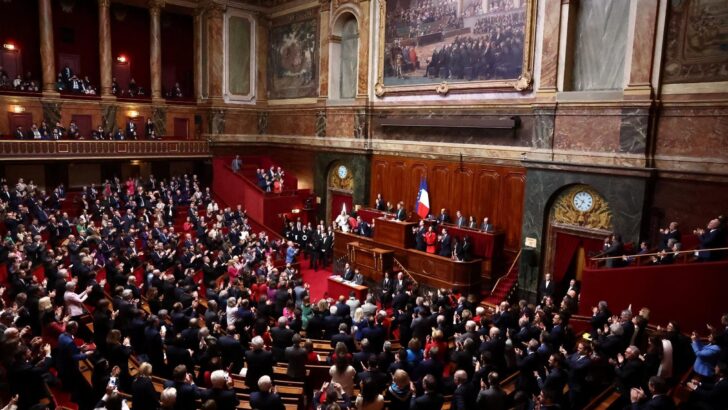I’ve been following developments in French politics – and culture – for some years, and I’m not at all surprised at the victory for Marine Le Pen’s National Rally (RN) in the first round of the parliamentary elections. It’s all been brewing for a long time.
As anyone who has read the writings of French literary eggheads and philosophers knows – there’s a lot of ‘alienation’ in French society. This is pinpointed by writers such as Michel Houellebecq and Michel Onfray, who stress the ‘decadence’ in which they depict the condition of France.
This ‘decadence’ is not measured, as with the reign of Louis XV, by extravagant aristocratic excess or hedonistic squandering of resources on the backs of the poor: but by the emptying of the French countryside in the process known as ‘desertification’, the ghettoisation of the suburbs, the burning of churches – over 600 churches were attacked in the space of one year recently– the rise in crime, the dominance of Islam, the decline in births, the resentment towards the ‘élites’, the increase in immigrants, the rule by Brussels, often depicted as haughty and directed by out-of-touch bureaucrats – ‘fonctionnaires’.
Culture
While popular books and TV churn out charming tales about idyllic life in a chateau in Provence, the gloomster French writers and philosophers have been telling a different story. The ‘wokeism’ imported from America is another source of savage criticism about how French culture is undermined – the Jewish-French philosopher Alain Finkielkraut has been a strong voice denouncing ‘le woke’ (he even hinted he might vote for Le Pen himself).
Obviously, the cost of living, of accommodation and of taxes are part of the bread-and-butter issues in an electoral debate. But there’s been a prevailing deeper malaise, focusing on the identity of France. In some quarters, Emmanuel Macron is loathed because he seems to represent the ‘globalism’, the banking and managerial classes who have betrayed the ‘certain idea of France’ which De Gaulle embodied. That Macron calls himself ‘Jupiter’ is cited in evidence of his particular arrogance.
While I have heard Jordan Bardella of the RN praised because he didn’t attend the top ‘grandes écoles’ of France’s élite. His working-class roots make him nearer to the ‘alienated’.
Where is the Catholic church in all this? Treading carefully, it would seem – sensitivities about state secularism are borne in mind.
Yet there are certainly French Catholics who share the analysis of gloomster intellectuals like Onfray and Houellebecq – that France is entitled to reclaim her historic identity, which was French and Christian. Attacks on churches have been blamed on ‘satanic cults, anarchism, profanations’ which some might indeed call ‘decadent’.
**
An almost universal response to President Joe Biden’s calamitous recent TV debate was to blame Jill, his wife. From The New York Times and every other source I perused came the response “Jill should have stopped all this!” If Mrs Biden only had the sense and sensibility to have restrained her husband running for a second term, this débacle could have been avoided. She’s been described as selfish, pushy, a power-driven Lady Macbeth who manipulates her husband – perhaps even plotting to govern as a regent, herself, when his frailty becomes too much.
This idea assumes that wives, basically, control their husbands and especially their elderly husbands. And it has often been the case in America that the wife of a prominent man is the real power. It is recalled that the wife of President Woodrow Wilson locked him up in a bedroom after he’d had a stroke, and proceeded to run the country herself.
In a way, it’s a kind of backhanded tribute to matrimony. And perhaps if Jill Biden’s finger were on the nuclear button instead of Joe’s, things would be none the worse!
***
I don’t know when I last heard ‘Faith of Our Fathers’ last played in an Irish church, but I heard it sung warmly at the Kentish parish church last weekend.
An increasing number of parishioners in this church are multi-ethnic, and it was interesting to note that the hymn was joined just as enthusiastically by those from Indian or Chinese heritage. “Our fathers, chained in prisons dark/Were still in heart and conscience free,” everyone sang enthusiastically, even if the lyric specifically refers to English martyrs for the Catholic faith.
In the British version, that’s made plain: “….and from the truth that comes from God/England shall then indeed by free.” In the version that is sung in Ireland, I think the given words are: “We will strive/To win all nations unto thee.”
This rousing hymn, written by Frederick William Faber, a Victorian convert from the Church of England to Rome, has fallen out of fashion for reasons of ‘patriarchy’ (what about faith of our mothers?), a perception of ultra-patriotism, and possibly, lack of ecumenism. But when it’s played, the congregation sings it!


 Mary Kenny
Mary Kenny French lawmakers seen inside the chambers of France's parliament in the Versailles Palace near Paris. (OSV News photo/Stephanie Lecocq, Reuters)
French lawmakers seen inside the chambers of France's parliament in the Versailles Palace near Paris. (OSV News photo/Stephanie Lecocq, Reuters) 